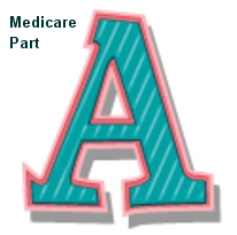 Medicare Part A is known as hospital insurance because it covers care received while in the hospital, skilled nursing facility or nursing home.
Medicare Part A is known as hospital insurance because it covers care received while in the hospital, skilled nursing facility or nursing home.
Who Qualifies for Medicare Part A?
You qualify for Medicare Part A if you are age 65 or older, you are already receiving benefits from Social Security, or you are under age 65 and are disabled. You may also qualify if you have ALS (Lou Gehrig’s disease) or you live in Puerto Rico and receive Social Security benefits.
In many cases you will be enrolled in Part A automatically. If that’s the case, you will receive your Medicare card three months before your 65th birthday. If you are disabled you will receive your card two years after your disability began.
If you are not enrolled automatically you will need to sign up for Part A (you can sign up online at ssa.gov or you can call Social Security at 1-800-772-1213). People who will need to sign up for Part A include those who are still working at age 65 and who have not yet applied for Social Security.
What does Part A cover?
You know that it covers hospital stays, but what all is included? Part A covers inpatient hospital care for up to 90 days for each benefit period. You also get 60 lifetime reserve days to use whenever you need them.
Services that are covered include surgery, lab tests, supplies (wheelchairs and walkers), etc. The key is that the service or supplies must be medically necessary to treat your condition.
If you are in the hospital, Part A covers the cost of your room (semi-private), meals, nursing care and other hospital services and supplies. Hospitals include acute care hospitals, critical access hospitals, inpatient rehabilitation facilities, long-term care hospitals, and mental health care facilities.
Note that the costs of a private-duty nurse and a private room are not covered by Medicare unless they are medically necessary due to your condition. Also not covered are television and phone charges.
In order for your hospital costs to be covered by Medicare, a doctor must determine that you need inpatient hospital care and the hospital must accept Medicare patients.
For skilled nursing care or long term care hospitals, up to 100 days are covered in each benefit period. In order to qualify for skilled nursing care, you must have been in the hospital for at least three consecutive days in the 30 days before you were admitted to the skilled nursing facility. You must also need skilled nursing care for seven days a week. If you need physical or occupational therapy, you must need them at least five days a week in order for Medicare to pay the cost of the skilled nursing facility.
The qualifying costs are similar to those incurred in a hospital, and include:
– room and meals (semi-private room only)
– skilled nursing care
– physical therapy
– medications
– medical supplies and equipment used while in the facility
– ambulance transportation
– dietary counseling
One of the biggest confusions regarding Medicare is whether nursing home care is covered or not. Under certain conditions, Medicare will pay some nursing home costs for patients who require skilled nursing or rehabilitative services. Note that Medicare covers medically necessary costs only. If you are in a nursing home for custodial care (i.e., you are unable to bathe yourself or dress yourself), then your costs will not be covered.
Home health care may also be covered by Medicare Part A. Your first 100 days are covered if you were in the hospital for at lease three consecutive days in the 14 days leading up to the need for home health care and you must be homebound.
Finally, Hospice care is also covered by Medicare Part A. Hospice care is for people who are terminally ill and is usually provided in your home. Up to five days of respite care (inpatient care provided so that the main caregiver can have a rest) is also provided as long as you stay in a Medicare approved facility.
Hospice care is provided when you have decided that you are no longer trying to cure your terminal illness or your doctor has made the decision that treatments to cure your condition are no longer working. As such, the purpose of hospice care is to provide comfort rather than to cure your illness.
Having said that, many of the same expenses that would be covered for inpatient care are covered for Hospice patients, including doctor and nursing services, medications to relieve pain and other symptoms, and medical supplies. In addition to medical services, Hospice also provides counseling services and grief counseling for both you and your family.
How Much Does Part A Cost?
Most people get Medicare Part A free because they paid Medicare taxes while they worked. If you did not work enough to qualify for free premiums, you could pay up to $441 each month (in 2013). In most cases, if you choose to purchase Part A you must also purchase Part B and pay monthly premiums for both plans.
Regardless of whether you get Part A free or you have to pay a premium, there are also deductibles and co-pays that must be paid. In 2013, the deductible for Medicare Part A is $1,184. That means you must pay $1,184 out of pocket before Medicare pays anything.
Once you have met your deductible, there are typically co-pays on any services you receive. A co-pay means you have to pay an amount that is considered your share of the Medicare costs and Medicare pays their share. Co-pays are typically a percentage (such as 20%) but they can be a set dollar amount too. For example, for inpatient hospital care, your co-pay is $296 per day, but for home health care your co-pay would be 20% of the Medicare-approved amount.
Many people are frustrated to learn that they have to pay deductibles and co-pays for Medicare Part A when they paid Medicare taxes throughout their working career. Unfortunately, the reality is that there are a lot of holes in Medicare Part A, so you will pay a lot of costs out of pocket.
You can purchase Medigap or Medicare Advantage policies to help cover some of the holes in Medicare Part A. Look for a discussion on those policies soon.





Leave a Reply